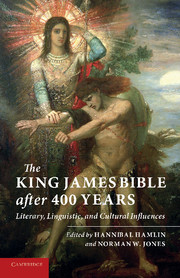Book contents
- Frontmatter
- Contents
- List of Figures
- List of Illustrations
- List of Contributors
- Acknowledgments
- Introduction
- Part I The Language of the King James Bible
- Part II The History of the King James Bible
- 3 The materiality of English printed Bibles from the Tyndale New Testament to the King James Bible
- 4 Antwerp Bible translations in the King James Bible
- 5 Philip Doddridge’s New Testament
- 6 Postcolonial notes on the King James Bible
- 7 From monarchy to democracy
- Part III Literature and the King James Bible
- Chronology of major English Bible translations to 1957
- Chronology of English Bible translations since 1957
- Select bibliography on the King James Bible
- Index of Bible quotations
- General index
- References
4 - Antwerp Bible translations in the King James Bible
Published online by Cambridge University Press: 05 May 2014
- Frontmatter
- Contents
- List of Figures
- List of Illustrations
- List of Contributors
- Acknowledgments
- Introduction
- Part I The Language of the King James Bible
- Part II The History of the King James Bible
- 3 The materiality of English printed Bibles from the Tyndale New Testament to the King James Bible
- 4 Antwerp Bible translations in the King James Bible
- 5 Philip Doddridge’s New Testament
- 6 Postcolonial notes on the King James Bible
- 7 From monarchy to democracy
- Part III Literature and the King James Bible
- Chronology of major English Bible translations to 1957
- Chronology of English Bible translations since 1957
- Select bibliography on the King James Bible
- Index of Bible quotations
- General index
- References
Summary
The history of the King James Bible (KJB) starts with William Tyndale.Admittedly, Tyndale was not the first person to translate the Bible into English, and he had neither the time nor the opportunity to prepare a translation of the entire Bible. Nonetheless, without William Tyndale the KJB would not be as it is today. His role in the genesis of the Authorized Version and in any subsequent English Bible is impossible to overestimate. And while the opinions of scholars about the exact percentage that is incorporated from Tyndale’s wordings into the KJB vary between 76 and 90 percent (though in different biblical books), all of them agree that a substantial portion of the Authorized Version is a verbatim rendering of William Tyndale’s translation. To put it somewhat bluntly: by modern standards of authorship, the KJB would be regarded as a form of plagiarism.
William Tyndale was born around 1494 in Gloucestershire, studied and was ordained to the priesthood in Oxford, and worked later as a private tutor in his native county. Around 1523 Tyndale applied for financial support and approval from the renowned humanist scholar Cuthbert Tunstall, bishop of London, for the preparation of a new translation of the New Testament from a Greek source text. Such an approval by the diocesan or local council had been required for all new translations of the Scripture into the vernacular since the Constitutions of Archbishop Thomas Arundel, approved by the Provincial Council of Oxford (1407) and promulgated at the London Council of St Paul’s (1409). The Constitutions also prohibited reading and possessing any unlicensed recent translations of the Bible (explicitly mentioning those associated with John Wyclif). The introduction of such a strict control on Bible translation in England was exceptional, as outside the realm, throughout Europe, biblical translations in the vernacular proliferated. With the advance of Luther’s teachings, however, and in the wake of Lollardy, a climate in which the Scripture in the vernacular was perceived by the English authorities as a weapon to advance one’s own ideas and as a threat not only to the religious but also to the social and political order, Tunstall politely refused to support Tyndale’s undertaking. After about a year spent in London, Tyndale moved to the Continent to realize his translation.
- Type
- Chapter
- Information
- The King James Bible after Four Hundred YearsLiterary, Linguistic, and Cultural Influences, pp. 100 - 123Publisher: Cambridge University PressPrint publication year: 2010



